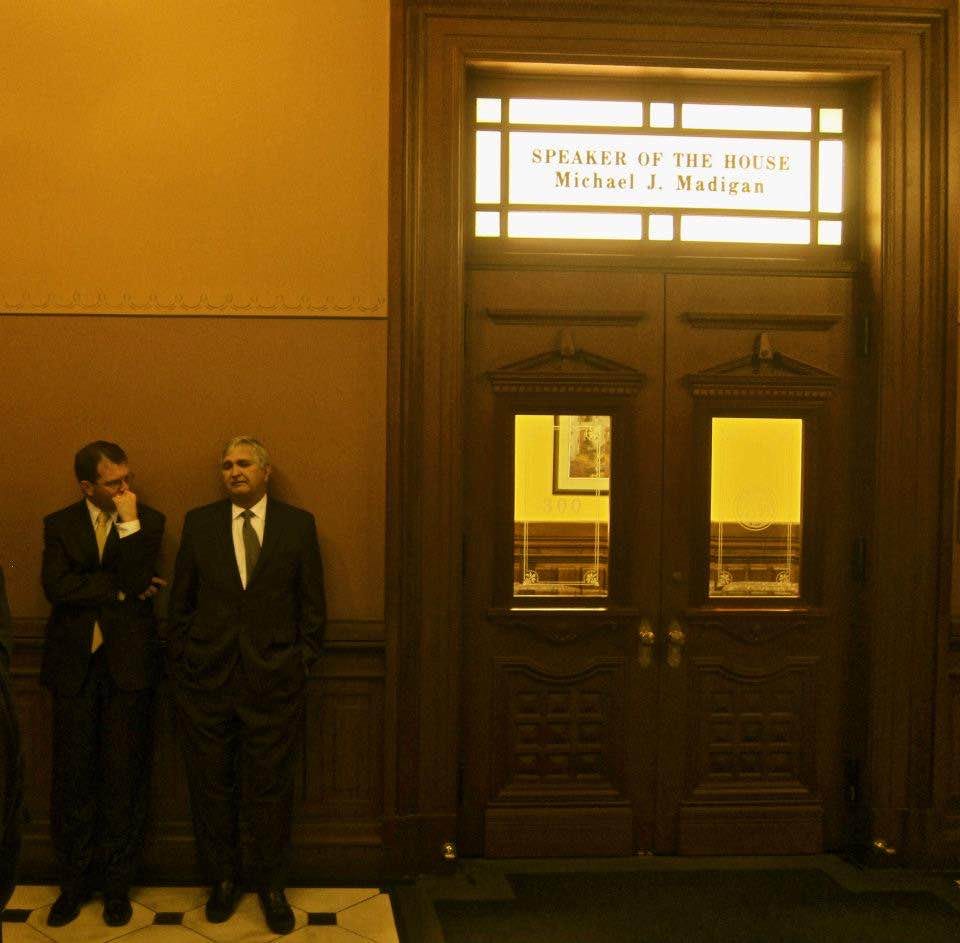My pal Bob Lyons called me last week.
“Have you read the book by Ray Long on Madigan?” Bob asked.
“Nope,” I said.
“I’ll buy you a copy. It has an interesting chapter about Madigan and our pensions.”
The book is The House that Madigan Built.
Long is a long-time investigative reporter for the Chicago Tribune.
Long takes us back to 2013 - earlier actually - when Democratic state party boss and Speaker of the House stuck a knife in the possibility of the state of Illinois ever paying what they owe to the pension systems of the retired teachers and other public workers.
Long calls the chapter “pension failure”.
At the time when I was blogging and meeting with legislators like pension cutters Democrats Dan Biss and Elaine Nekritz I called it pension theft.
After reading Long’s book it becomes clear it was pension homicide.
Recall that this was when Pat Quinn was governor and was saying how he was put on this earth to solve the pension problem. But Quinn, like Madigan and John Cullerton, state senate president at the time, all thought the solution was cutting pensions rather than paying what the state owed.
Madigan’s proposed cuts to our pensions were draconian.
I often have said that at the time I was organizing against the cuts I never sat down to calculate what I personally would have lost if Madigan had won.
I didn’t want to know.
Cullerton worked out a counter-deal with the state’s public employee unions that still conceded on fundamental contractual and constitutional rights and promises.
A few of us opposed both the Madigan and Cullerton deals.
“I think there will be at least four members of the Illinois Supreme Court that will approve the bill,” Madigan famously told the press.
That was total bullshit, of course. Brilliant Madigan bullshit intended to intimidate the leaders of the state’s public employee unions.
But, man, did the union leadership fall for it.
That led them running to Cullerton, whose pension plan was as much in violation of the state constitution’s pension protection clause as was Madigan’s, as Long points out.
Those of us who were pension protection activists were attacked by the union leadership for opposing the Cullerton plan. Bob Haisman, former Illinois Education Association president and retiree union leader, called us naive, arguing that we had a better chance with the legislature than the courts.
He then launched a social media campaign targeting us, calling us the “perfection caucus.”
As he was on so many issues confronting educators, Haisman was dead wrong on this too.
But he was just doing the union leadership’s bidding.
The state’s public employee union leaders mobilized the membership to back the Cullerton pension theft plan over the Madigan pension theft plan.
Madigan didn’t have four votes on the Supreme Court.
He had none.
Zero.
Michael Madigan’s daughter, Lisa, was Attorney General.
Her lawyers argued before the court that the state had “police powers” to seize our pensions.
Writing for the Court, which voted unanimously in rejecting Lisa Madigan police powers argument, Republican Justice Karmeier wrote, “The law was clear that the promised benefits would have to be paid and that the responsibility for providing the state’s share of the necessary funding fell squarely on the legislature’s shoulders. It is a crisis for which the General Assembly is largely responsible.”
The union leadership had once again been bamboozled by Madigan.
Yet, as Long points out, Madigan won either way.
The high court’s decision did not automatically translate into a crushing political loss for Madigan in Springfield. Voting for a pension plan took the sizzling topic off the legislature’s immediate agenda and quieted “good-government” critics. Lawmakers could tell constituents that the legislature voted for a pension fix rather than have it hanging as a unresolved campaign issue. Once the court ruled, the momentum for massive reform started to fade.
The pension liability now exceeds $150 billion.
It will never be paid.
Madigan had successfully killed the pension issue.





Madigan is the personification of evil. How much did he personally make from whom for continuation of perpetual overpayment of interest for state pensions?